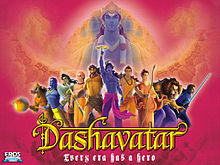- Dashavatar (film)
-
Dashavatar 
Directed by Bhavik Thakore Produced by Vimal Shah Written by Hriday Lani Narrated by Shatrughan Sinha Music by Anand Kurhekar Release date(s) 13 June 2008 Country India Language Hindi Dashavatar[1] is a 2008 animated film based on the ten incarnations of Lord Vishnu.[2]
The film is produced by Vimal Shah under the banner of Phoebus Media. It is directed by Bhavik Thakore. Music is by Anand Kurhekar and lyrics are by Sandeep Khare. The story tells us about the ten incarnations of Lord Vishnu as seen by two children. The film released in cinemas in India on 13 June 2008.
Contents
Plot
The concept of Dashavatar (Ten Avatars) has tremendous significance even in today’s jet age. Evil has been present at all stages in the evolution of mankind and the Dashavatar in a way brings out this evolution through the triumph of good over evil. The most famous of the divine incarnations of Lord Vishnu are Rama, whose life is depicted in the Ramayana, and Krishna, whose life is depicted in the Mahabharata and the Bhagavad Gita. The four great era or epochs in Hinduism are: Satya Yug, Treta Yug, Dwapar Yug and Kali Yug. Satya Yug or the Age of Truth is said to last for four thousand divine years, Treta Yug for three thousand, Dwapara Yug for two thousand and Kali Yug will last for one thousand divine years. It is also believed that three of these great ages have already passed, and we are now living in the fourth one. The four ages are said to symbolize the four phases of human evolution during which man gradually lost the awareness of his inner self. Another theory explains these epochs of time on the basis of the degree of loss of righteousness in the world. It says, during Satya Yug only truth prevailed (Sanskrit Satya = truth), Treta lost ¼ truth, Dwapar lost ½ truth and Kali is left with only ¼ truth. Evil and dishonesty has replaced truth in the last three ages or yugs. This verse from the Indian epic, The Bhagavad Gita, embodies the soul of Dashavatar. Lord Vishnu, the Preserver of life manifests Himself in many forms through the eras to wipe out evil and establish the rule of righteousness.
The ten avatars of Vishnu are known to all and Dashavatar is an energising experience that shows how some of the darkest powers on earth were eradicated by the most popular heroes from the past, present and even the future...
Dashavatar weaves together the fascinating stories of Rama, Krishna, Parshurama, Vamana, Narsimha, (sundari one who is in focus at the time of samudramanthan and help to god in getting amrit)...and also the tales of Vishnu in earlier avatars – Matsya, Kurma and Varaha...and yes, finally — Kalki Avatar! Dashavatar is an odyssey through time, showing the values of the old world matching the sensibilities of the modern one...
Dashavatar is the all-encompassing epic that celebrates the recurring triumph of good over evil – tenfold!
The 9 avatars so far are Matsya (fish), Kurma (tortoise), Varaha (boar), Narasimha (half-man, half-lion), Vamana (dwarf man), Parshurama (man with an axe), Rama (moral man), Krishna (philosophical man). The ninth avatar is gautam buddha. The tenth avatar, Kalki is yet to manifest. From the sequence of the avatars itself, it is obvious that it represents the sequence of the origin of life.[3]
- Matsya, The Fish, appeared in the Satya Yuga.
- Kurma, The Tortoise, appeared in the Satya Yuga.
- Varaha, The Boar, appeared in the Satya Yuga.
- Narasimha, The Man-Lion (Nara = man, simha = lion), appeared in the Satya Yuga.
- Vamana, The Dwarf, appeared in the Treta Yuga.
- Parashurama, the man with an axe, appeared in Treta Yug.
- Rama, Prince and king of Ayodhya and the Moral Man, appeared in the Treta Yuga.
- Krishna, The Cowherd and Philosophical Man, appeared in the Dwapara Yuga.
- Kalki, the Sage prince ("Eternity", or "time", or "The Destroyer of foulness"), who is expected to appear at the end of Kali Yuga, the time period in which we currently exist, which will end in the year 428899 CE.
Cast
- Sachin Khedekar — Lord Vishnu
- Shreyas Talpade — Narad
- Roopali Ganguly — Apsara
- Vinay Apte — Kansa
- Shishir Sharma — Bali Raja
- Ashish Vidyarthi — Hiranakshyapu
- Kenneth Desai — Lord Indra
Playback singers
- Shankar Mahadevan
- Shaan
- KK
- Kunal Ganjawalla
- Rattan Mohan Sharma
- Sanjiv Abhyankar
- Shreya Ghoshal
- Ketaki Mategaonkar
- Rahul Deo
See also
- List of animated feature films
- Phoebus Media (an Indian company which has released a number of animated features)
References
External links
Categories:- 2008 films
- Indian films
- Hindi-language films
- Animated films
- Hindu mythological films
Wikimedia Foundation. 2010.
